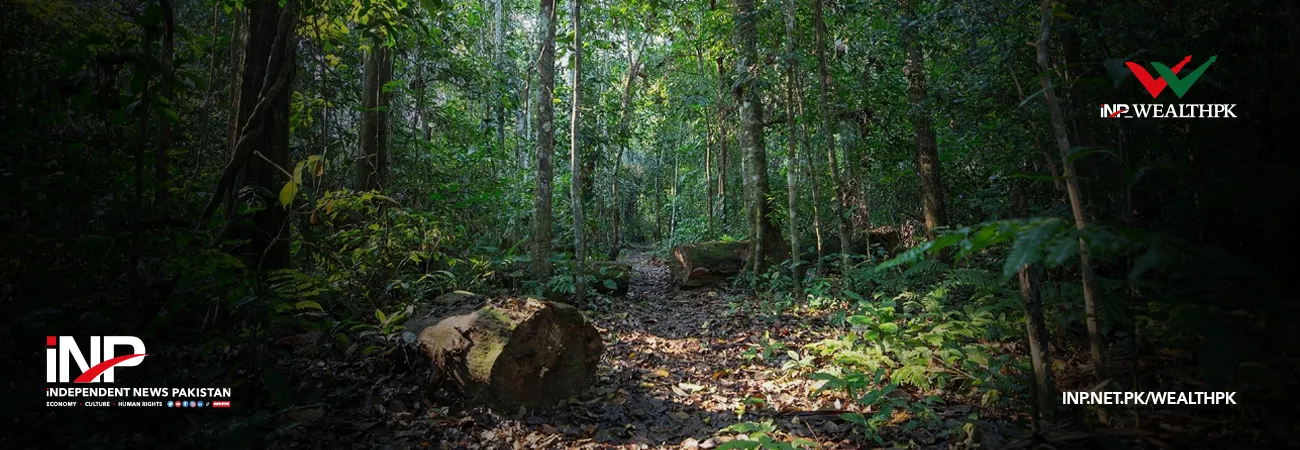INP-WealthPk
Amir Khan
The interplay of climate change and biodiversity is giving rise to pressing concerns that necessitate a coordinated response from all the stakeholders to address them, says Naeem Ashraf Raja, Director Biodiversity Programme at the Ministry of Climate Change and Environmental Coordination. Talking to WealthPK, he said in rural regions, the scarcity of electricity and natural gas resources had spurred an unsustainable rate of fuel wood exploitation, resulting in alarming deforestation. “This ecological devastation is compounded by overgrazing, soil erosion, escalating water salinity, and non-sustainable agricultural practices, collectively posing substantial threats to Pakistan’s biodiversity.” Pakistan is home to a wide variety of species, including 198 mammals, 700 birds, 177 reptiles, 22 amphibians, 198 freshwater fish and over 6,000 flowering plant species. Many of these species are dependent on forests for their survival.
According to the National Climate Resilience and Adaptation Plan 2023-2030, despite having only 5.7% of its land area covered by forests, Pakistan is experiencing rapid deforestation. This is due to a combination of commercial logging and excessive forest use by a growing population. “The disappearance of trees and vegetation is causing the loss of these species, and creating a cascade of extinctions,” noted Ashraf Raja, the climate change ministry official. He pointed out that species such as squirrels, woodpeckers, snails, ferns and mushrooms were all at risk of extinction due to deforestation. He added that the effects of deforestation were already being seen in the juniper forests of Balochistan and the mangrove forests of the Indus River Basin. Ashraf Raja emphasised the urgency to alleviate direct pressures on biodiversity and promote sustainable practices.
“The rapid pace of biodiversity loss is a serious concern. We need to take immediate steps to reduce the pressure on our natural resources and promote sustainable practices. This will require concerted efforts from all stakeholders, including the government, the private sector and civil society.” A civil society activist, Qamar Naseem underscored the importance of empowering local communities, both urban and rural, to tackle the issues of climate change and biodiversity. She said, “Local communities are often the first to be affected by climate change and biodiversity loss. We need to empower them to act to protect their own environment. This can be done by providing them with education and training, and by giving them a voice in decision-making.” To align with the Paris Agreement on Climate Change, Pakistan enacted the Pakistan Climate Change Act 2017, establishing a Climate Change Council and Authority to oversee adaptation and mitigation projects.
Article 8 empowers the Climate Change Authority to formulate guidelines for safeguarding renewable and non-renewable resources, habitats, and biodiversity affected by climate change. The increasing human population is putting pressure on biodiversity resources, and the complex relationship between climate change and declining biodiversity is evident. Conserving biodiversity is thus essential for achieving the Sustainable Development Goals. The National Biodiversity Strategy and Action Plan (NBSAP), which was endorsed in 2018, echoes the SDGs and serves as Pakistan’s Nationally Determined Contribution (NDC), addressing ecosystem restoration and species conservation. In preparing the 5th National Report for the Convention on Biological Diversity (CBD), Pakistan engaged provincial governments to reach a consensus on the NBSAP targets for the period 2018-2030.
Continuing the discussion, Ashraf Raja of the climate change ministry proposed safeguarding biodiversity by strengthening research and academic capabilities, integrating biodiversity conservation principles into diverse sectors, conducting impactful applied research, and establishing partnerships with international research institutions. He believes that these strategies will help better understand the relationship between biodiversity and climate change, develop more effective conservation strategies and ensure the future of biodiversity in Pakistan. Meanwhile, Samar Hussain, the Conservator of Wildlife at the Ministry of Climate Change and Environmental Coordination, declared: “The loss of forests is one of the major threats to Pakistan’s biodiversity. Other critical threats, such as hunting, overgrazing, soil erosion, salinity, water logging and unsustainable agricultural practices, are also taking a toll on our natural resources. We need to take urgent action to address all of these threats if we want to protect our biodiversity.”
Credit: INP-WealthPk













